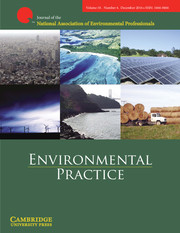Article contents
Effect of Selective Pressure and Genetically Engineered Microorganism (GEM) Densities on Mercury Resistance (mer) Operon Transfer in Elbe River and Estuarine Sediments
Published online by Cambridge University Press: 31 October 2005
Abstract
Bacterial reduction of mercury ions to elemental mercury by the mer operon-encoded microbial resistance mechanism has recently been shown to be a promising approach in the bio-remediation of mercury-contaminated wastewater. Mercury resistance is widespread among environmental bacteria and several isolates have proven to be adaptable catalyzers for mercury reduction in bioreactors. To accomplish high, stable, and predictable performance, however, the genetically engineered microorganism (GEM) Pseudomonas putida KT2442::mer73 has been constructed, which constitutively expresses the mercury resistance operon at a high level, is nonpathogenic, and does not contain plasmids. To assess the safety of this GEM in an open environmental application, gene transfer was investigated in stream and estuarine microcosms containing sediments from the Elbe River and Roskilde Fjord, Denmark. In P. putida KT2442::mer73, the merTPAB genes have been stably integrated into the chromosome to reduce the chance of horizontal transfer. Consequently gene transfer to an isogenic recipient strain, P. putida KT2442::Tc, could not be detected, although parameters such as recipient cell density, cell shock, continuous addition of cells, or application of mercury selective pressure were adjusted with respect to increasing the probability of gene exchange. On the basis of these experiments, the strain P. putida KT2442::mer73 can be regarded as safe.
- Type
- Remediation of Mercury
- Information
- Copyright
- © 2004 National Association of Environmental Professionals
- 2
- Cited by




